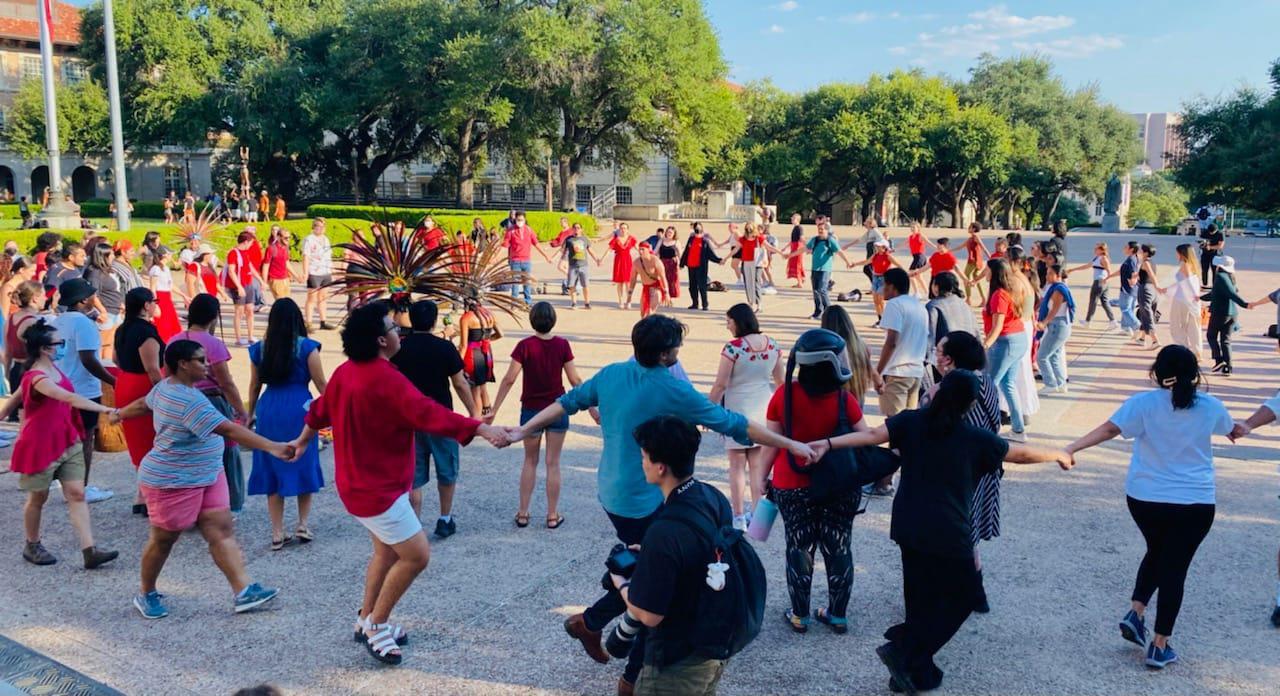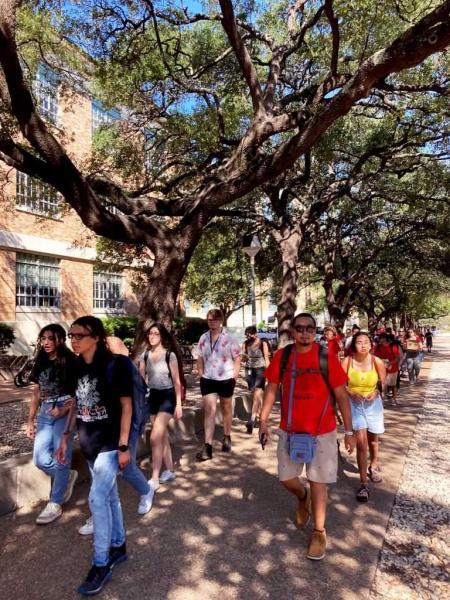
Approximately 100 Indigenous students at the University of Texas at Austin gathered in an effort to have UT return three ancestral remains from Hays County, currently kept in cardboard boxes, to the Miakan-Garza Band of the Coahuiltecan people. Above, Danzantes led participants in a unity dance-prayer to unite everyone supporting the reburial of the ancestors. Below, students begin their walk from across campus to the UT tower. Photos courtesy of Indigenous Cultures Institute
Miakan-Garza Band seeks return of remains from UT Austin
Approximately 100 Indigenous students at the University of Texas at Austin gathered in an effort to have UT return three ancestral remains from Hays County to the Miakan-Garza Band of the Coahuiltecan people.
Students shouted “return the remains” during a pilgrimage and prayer event that took place Friday. The Miakan-Garza tribe intends to rebury their three ancestors in the City of San Marcos’ Sacred Springs Reburial Grounds, a cemetery they helped to establish in 2016.
“We believe that when a person dies, two processes begin,” said Dr. Mario Garza, Cultural Preservation Officer for the Miakan-Garza tribe. “First the body is buried and becomes part of the life cycle of Mother Earth. Then the spirit begins its journey to the Great Mystery.”
Garza added that “if the body is exhumed from the earth, this stops the natural process. The body is no longer in balance with Mother Earth and the spirit stops its spiritual journey and lingers in agony until the body is reburied.”
The students who participated on Friday gathered at the Winship building, approximately three blocks from the tower, and made a pilgrimage journey to the base of the UT tower where elders from the Miakan-Garza tribe were waiting to receive them. At the tower, danzantes — people who pray through dance — had constructed two altars, one for their prayer dances and one for the ancestors. The ancestors’ altar had flowers and gifts, and displayed cardboard boxes to symbolize how 2,400 Indigenous remains are stored in a warehouse at the J.J. Pickle campus.

The Miakan-Garza Band began publicly seeking to secure the remains of their three ancestors unearthed in Hays County which are currently a part of the University of Texas at Austin’s collection of more than 2,400 native remains in 2020.
UT President Jay Hartzell announced in a letter addressed to Garza on Sept. 25, 2020 that the university would promptly seek authority from the National Park Services to have the remains reinterred by requesting a recommendation from its Native American Graves Protection and Repatriation Act Review Committee. The recommendation would allow the university to offer the remains promptly for reburial, Hartzell’s letter said.
“The University of Texas at Austin respects the indigenous people who live and have lived in Texas and recognizes the spiritual and cultural significance of interment of their ancestors,” Hartzell wrote in 2020. “I also acknowledge the particular significance of this issue to you and the Miakan-Garza Band. We are committed to honoring your cultural and religious perspectives, while continuing to follow the established legal procedures outlined in federal law.”
Maria Rocha, member of the Miakan-Garza and board of elders of Indigenous Cultures Institute which was founded by the tribe said “this is why we are dedicated to reburying our ancestors.”
“Two years ago the UT president made a promise to return our ancestors for reburial; and he has not kept his promise,” Rocha said.
The Miakan-Garza band claims UT’s attorneys’ are fighting against the conveyance of the remains.
“UT says it cannot return our ancestors because two federally recognized tribes object to this conveyance,” says Garza. “The Native American Graves Protection and Repatriation Act (NAGPRA) allows federally recognized tribes to object, but this does not prevent the institution (UT) from conveying the remains. NAGPRA says that only if a federally recognized tribe wants to claim those remains, then the institution cannot convey the remains to a non-federally recognized tribe. The tribes that are objecting, don’t want our ancestors’ remains. So UT has the authority to convey them to us.”
The tribe says it has documentation from a NAGPRA official that supports the tribe’s assertion that UT has the power and authority to convey the ancestors to the Miakan-Garza, despite any objections.
“UT also says that we did not provide sufficient documentation to prove cultural affiliation,” Garza said. “We submitted the same documentation to Texas State University, the NAGPRA Review Committee, and the Office of the Secretary of the Interior, and all three accepted this documentation. Why does UT refuse to accept that same documentation?”
UT claims the remains are prehistoric, meaning they are over 500 years old. The only Native communities in Texas at that time were the Coahuiltecan people who are descendants of the Paleo-Indians in this area. The Miakan-Garza belong to the Coahuiltecan communities and are related to the three prehistoric remains that were exhumed from Hays County, the tribe said.
The Miakan-Garza band says UT officials are seeking a solution to repatriating over 2,400 remains in their collection, by establishing a cemetery where they can execute a mass burial of all the remains. They intend to make this land mass in the shape of the state of Texas. The Miakan-Garza members said, however, they do not want to wait for this new cemetery, which requires appropriating funds, acquiring a significant amount of federal land, obtaining approval of federally recognized tribes, and preparation of the gravesites for all of the remains.
“First, we don’t believe UT will release its collection for reburial,” says Garza. “Second, if UT is successful in establishing this cemetery, we’re talking about several years from now. In the meantime, the spirits of our ancestors from Hays County who lived at our people’s Sacred Springs origination site, continue in agony waiting for their reburial.
The Miakan-Garza band said several communities are starting a petition and sending it out nationwide. This document should be available soon on the Indigenous Cultures Institute’s website: https://indigenouscultures.org/.
“We have an obligation to bring those ancestors home,” Rocha said. “UT does not respect our spiritual beliefs and that’s the problem. UT sees this as a legal issue. We see this as a spiritual issue, a moral issue, a human rights issue. UT should do the right thing.”
For more information, visit IndigenousCultures.org/reburial.











